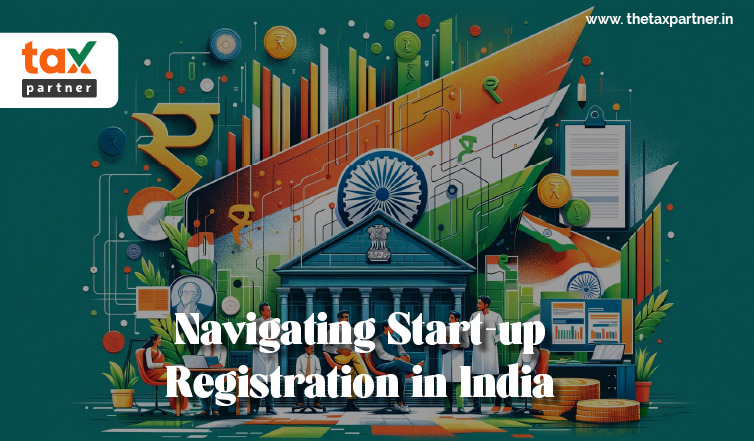Navigating Start-up Registration in India
From Idea to Incorporation: Navigating Start-up Registration in India
Author-Tanvi Thapliyal
India's startup ecosystem has become one of the most active in the world in recent years, promoting economic growth, entrepreneurship, and innovation. The procedure of start-up registration, which is essential for prospective business owners hoping to formalise their endeavours and access a multitude of advantages, is at the centre of this flourishing ecosystem.
What is a start-up?
As to the definition provided by the Indian government, a start-up is an organisation that is usually in its first phases of operation and is motivated by innovation, scalability, and the possibility of capitalising on noteworthy market opportunities. A start-up, according to the Indian government, is an organisation that is:
-
incorporated as a limited liability partnership (LLP), partnership firm, or private limited company.
-
not older than 10 years as of the registration or incorporation date.
-
Not more than INR 100 crore in annual turnover in any of the previous fiscal years.
-
Pursuing the invention, creation, implementation, or marketing of novel goods, systems, or services that are fuelled by intellectual property or technology.
The significance of initial registration
Starting a business and registering a start-up is a crucial step for entrepreneurs because it provides many attractive benefits:
-
Legal Recognition: The entity is given legal recognition by registering as a start-up, which establishes its identity as a legitimate company operation for the purposes of the law.
-
Access to perks: The Government of India, state governments, and several trade associations provide a plethora of incentives, perks, and support systems to registered start-ups. These advantages consist of tax breaks, funding support, subsidies, and enrollment in government initiatives designed specifically for new businesses.
-
Credibility and Trustworthiness: A start-up's registration gives it credibility and reliability, which inspires confidence in partners, consumers, investors, and other stakeholders. It conveys a dedication to openness, adherence, and decorum in behaviour.
-
Facilitated funds: Investors, venture capitalists, and financial institutions are frequently more willing to provide funds to registered start-ups. When a start-up registers, it becomes more visible and appealing to investors who are looking to fund promising ventures.
-
Networking possibilities: Enrolling as a start-up gives you access to industry events, incubators, accelerators, mentorship programmes, and networking possibilities. By connecting with peers, mentors, industry experts, and possible partners through these channels, entrepreneurs can accelerate their growth trajectory.
for entrepreneurs seeking to lay a strong foundation for their businesses and take advantage of the entire range of advantages provided by the thriving Indian start-up ecosystem, registering a start-up is more than just a legal requirement rather, it is a strategic need. It establishes the foundation for success by empowering business owners to confidently and clearly negotiate the difficulties of ownership.
Criteria for registering a start-up in India
Business Entity:
-
As an individual, you have the option to register your business under your own name if you are a sole proprietor.
-
Partnerships involve two or more individuals coming together to collaborate on business activities.
-
Private Limited Companies are a great option for businesses that want to protect themselves from personal liability and have the potential to grow and expand.
-
LLPs are a great choice for professionals and service-oriented businesses who want the benefits of flexibility and limited liability.
The residency requirement is:
-
For certain types of businesses, it is required that at least one director is a resident of India.
-
It is possible for foreign nationals to start a business in India. However, they may have to follow some extra regulations, like getting certain visas or permissions.
What is the age requirement?
-
To be a director of the company, you must be at least 18 years old.
-
This means that the people in charge of running and making decisions for the business are legally capable adults.
Ensuring Compliance with Regulations:
-
Each industry may have its own set of regulations and licencing requirements that need to be followed. Make sure you follow the necessary regulations that apply to your business.
-
Make sure to follow the laws and regulations in your area that pertain to running a business, paying taxes, managing employees, and maintaining environmental standards.
-
Make sure to protect your intellectual property by obtaining trademarks, patents, or copyrights in accordance with the relevant laws on Intellectual Property Rights (IPR).
Benefits of registering a start-up in India
-
Registration is important because it gives the business entity legal recognition, which helps to distinguish it from its owners.
-
The main benefit of forming a company is that it provides protection for the founders' personal assets. This means that the founders' liability is limited to the assets of the company.
-
Registering your business can boost its credibility and legitimacy, which can make it more appealing to potential investors, venture capitalists, and banks.
-
Investors are more likely to invest in registered entities because they provide assurance of compliance and governance standards.
There are several tax benefits that you may be eligible for:
-
Start-ups that are registered under schemes like Startup India are eligible for a range of tax incentives and exemptions.
-
There are several benefits available, such as income tax exemptions for the first few years, tax credits for research and development (R&D) expenses, and capital gains tax exemptions for eligible investors.
-
The concept of "Ease of Doing Business" refers to the level of simplicity and efficiency in conducting business activities. It encompasses various factors such as regulations, bureaucracy, and infrastructure that can either facilitate or hinder business operations.
-
Start-ups that are registered receive the advantage of having simplified regulatory and compliance processes.
-
Users can conveniently access online portals and use streamlined procedures to handle filings, approvals, and registrations. This helps to reduce administrative burdens and make the process more efficient.
Improving the perception of your brand:
-
Registering your business adds credibility and professionalism, which can enhance your brand image.
-
Instilling trust and confidence among customers, suppliers, and partners is important because it helps to foster strong business relationships and collaborations.
The government provides support:
-
As a registered start-up, you'll have access to various government initiatives, grants, and schemes that are designed to support and encourage innovation and entrepreneurship.
-
There are a variety of resources available to support entrepreneurs, such as funding programmes, incubation support, mentorship networks, and market access opportunities. These resources are provided by different government agencies and departments.
Registration process for start-ups in India
Select a business structure
-
When deciding on the best structure for your business, it's important to consider factors like liability, scalability, and ownership.
-
You have several options to choose from when it comes to the type of business structure you want to establish. These options include sole proprietorship, partnership, private limited company, or limited liability partnership (LLP).
Obtain a Digital Signature Certificate (DSC)
-
make sure to obtain a Digital Signature Certificate (DSC) for the authorised signatories who are involved in the registration process.
-
A Digital Signature Certificate (DSC) is required in order to submit registration documents online to the Ministry of Corporate Affairs (MCA).
Apply for a Director Identification Number (DIN)
-
Every director of the company needs to apply for a unique Director Identification Number (DIN) from the Ministry of Corporate Affairs (MCA).
-
DIN, which stands for Director Identification Number, is a necessary requirement for directors to effectively manage company affairs and sign documents electronically.
Reserve a name
-
Think of a one-of-a-kind name for your business and make sure it's not already taken.
-
You can apply for name reservation by using the MCA's RUN (Reserve Unique Name) portal.
-
Make sure that the name you're suggesting follows the naming guidelines and isn't the same as any other company or trademark.
Incorporate the company/LLP
-
Prepare and file incorporation documents for a company, such as the Memorandum of Association (MoA) and Articles of Association (AoA).
-
Please make sure to submit the necessary documents along with the incorporation fee to the MCA.
-
Provide your PAN (Permanent Account Number) and TAN (Tax Deduction and Collection Account Number).
-
You can apply for a Permanent Account Number (PAN) from the Income Tax Department.
-
If you need to deduct and remit taxes at source, you should apply for a Tax Deduction and Collection Account Number (TAN) if it is applicable to you.
Apply for GST registration
-
If your business turnover exceeds the threshold limit, you should register for Goods and Services Tax (GST) by visiting the GST portal.
-
If you want to comply with GST laws, you need to get a GSTIN (GST Identification Number) for your business.
Open a bank account
-
Open a bank account for your business with a reputable bank.
-
Make sure to submit the required documents, which include the incorporation certificate, PAN card, and proof of identity/address for the authorised signatories.
Compliance
-
follow all the necessary regulations, such as submitting annual filings, holding board meetings, and filing taxes in accordance with the relevant laws and regulations.
-
stay informed about any changes in regulatory requirements and meet all the necessary obligations to keep your business in good legal standing.
Extra tips to consider when registering a start-up in India
consider seeking professional assistance-
-
consider hiring legal and financial experts who can provide guidance and assistance during the registration process.
-
Experienced professionals are able to assist in complex legal requirements,
-
making sure that all necessary regulations are followed, and speeding up the registration process.
Make sure you are aware of your tax responsibilities
-
understanding the tax implications that apply to your chosen business structure and industry.
-
Make sure you have a good understanding of the different taxes that you need to pay, like income tax, GST, and corporate tax.
-
comply with the deadlines for filing and paying these taxes.
Keep yourself informed
-
Stay updated on any changes in regulatory requirements and government policies that may impact start-ups.
-
Make sure to keep an eye on updates from regulatory authorities, industry associations, and government portals to stay informed about any changes in laws, incentives, or compliance obligations.
Network and collaborate
-
Connect with other entrepreneurs, industry peers, and mentors who can offer advice and support as you navigate your entrepreneurial journey.
-
Work together with other start-ups, industry experts, and academia to make the most of our resources, exchange knowledge, and discover new possibilities for growth and innovation.
Invest in learning
-
As an entrepreneur, it's important to always keep learning and improving your skills.
-
You can consider attending workshops, seminars, and training programmes that are specifically designed to help you improve your knowledge and skills in entrepreneurship, business management, and industry-specific areas.
-
These events can be a great way to enhance your expertise in these fields.
Make sure to prioritise the needs of the customer.
-
It's important to focus on understanding your target market and finding effective ways to meet your customers' needs.
Make sure to protect your intellectual property
-
Make sure you know and safeguard your intellectual property assets, like trademarks, patents, and copyrights.
-
Talk to experts in intellectual property to protect your inventions and creative works from being copied or misused.
Embrace innovation and adaptability
-
Encourage a mindset of creativity and flexibility in your start-up to remain competitive in a fast-evolving business environment.
-
Stay ahead of the game by embracing new technologies, trends, and market opportunities to come up with innovative ideas and set yourself apart from the competition.
Conclusion
Starting a business in India can be both thrilling and challenging. Aspiring entrepreneurs can navigate the intricate landscape of business establishment with confidence by understanding the eligibility criteria, benefits, registration process, and additional tips outlined in this guide.
Registering your start-up not only gives you legal recognition and protection, but it also gives you access to funding opportunities, tax benefits, and government support initiatives. Enhancing the credibility and brand image of a business helps to build trust among stakeholders and makes operations run more smoothly.
However, registering for something involves a lot of careful planning, following regulations, and having a good understanding of tax responsibilities and how the industry works. It's important to get professional help, keep up with regulatory changes, and prioritise the needs of your customers to make sure your start-up is successful and can last in the long run.
Ultimately, if entrepreneurs follow the recommended steps, use the resources available to them, and embrace innovation and adaptability, they can establish a solid foundation for their start-ups and begin a journey of growth, innovation, and entrepreneurial success in the ever-changing Indian market.
FAQ's
Q1: What are the different types of business structures I can register in India?
A1: In India, you can register various business structures including sole proprietorship, partnership, private limited company, and limited liability partnership (LLP). Each structure has its own set of advantages and considerations.
Q2: Do I need to be an Indian citizen to register a business in India?
A2: No, Indian citizenship is not mandatory for registering a business in India. However, at least one director must be a resident of India for certain types of businesses.
Q3: How long does it take to register a start-up in India?
A3: The time taken for registration varies depending on the type of business structure and the efficiency of document preparation and submission. Typically, it can take anywhere from a few days to a few weeks to complete the registration process.
Q4: What is a Digital Signature Certificate (DSC) and why is it required?
A4: A Digital Signature Certificate (DSC) is a secure digital key that certifies the identity of an individual or organization. It is required for filing registration documents online with the Ministry of Corporate Affairs (MCA) in India.
Q5: What is a Director Identification Number (DIN) and how do I obtain it?
A5: A Director Identification Number (DIN) is a unique identification number assigned to individuals who wish to become directors of companies registered in India. Each director must obtain a DIN from the MCA by submitting the required documents online.
Q6: Can I reserve a business name before registering my start-up?
A6: Yes, you can apply for the reservation of a proposed business name through the MCA's RUN (Reserve Unique Name) portal before registering your start-up. It is advisable to check the availability and conformity of the name with naming guidelines before applying.
Q7: What are the tax benefits available for registered start-ups in India?
A7: Registered start-ups in India, especially those registered under schemes like Startup India, are eligible for various tax incentives and exemptions. These may include income tax exemptions, tax credits for research and development (R&D) expenses, and capital gains tax exemptions for eligible investors.
Q8: Do I need to register for Goods and Services Tax (GST) for my start-up?
A8: If your business turnover exceeds the threshold limit prescribed by the GST laws, you are required to register for Goods and Services Tax (GST) through the GST portal. GST registration is mandatory for businesses engaged in the supply of goods and services in India.
Q9: What ongoing compliance requirements do I need to fulfill after registering my start-up?
A9: After registration, start-ups need to ensure compliance with ongoing regulatory requirements such as annual filings, board meetings, tax filings, and other statutory obligations as per applicable laws and regulations.
Q10: Can I make changes to the registered details of my start-up after registration?
A10: Yes, you can make changes to the registered details of your start-up such as address, directors, and authorized signatories by filing the required forms with the MCA. However, certain changes may require approval from relevant authorities or shareholders.



